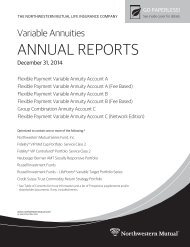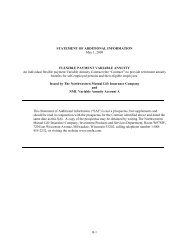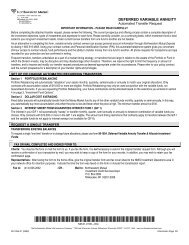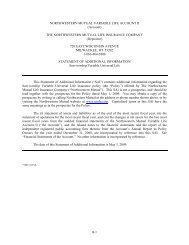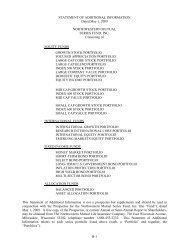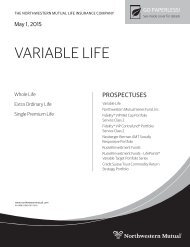B-1 STATEMENT OF ADDITIONAL INFORMATION Dated May 1 ...
B-1 STATEMENT OF ADDITIONAL INFORMATION Dated May 1 ...
B-1 STATEMENT OF ADDITIONAL INFORMATION Dated May 1 ...
Create successful ePaper yourself
Turn your PDF publications into a flip-book with our unique Google optimized e-Paper software.
2. Ratification of Selection of AuditorsThe Adviser will generally rely on the judgment of the issuer’s audit committee in selecting theindependent auditors who will provide the best service to the company. The Adviser believes thatindependence of the auditors is paramount and will vote against auditors whose independenceappears to be impaired. We will vote against proposed auditors in those circumstances where (1) anauditor has a financial interest in or association with the company, and is therefore not independent;(2) non-audit fees comprise more than 50% of the total fees paid by the company to the audit firm; or(3) there is reason to believe that the independent auditor has previously rendered an opinion to theissuer that is either inaccurate or not indicative of the company's financial position.B. Equity-Based Compensation PlansThe Adviser believes that equity-based incentive plans are economically significant issues uponwhich shareholders are entitled to vote. The Adviser recognizes that equity-based compensationplans can be useful in attracting and maintaining desirable employees. The cost associated with suchplans must be measured if plans are to be used appropriately to maximize shareholder value. TheAdviser will conduct a case-by-case analysis of each stock option, stock bonus or similar plan oramendment, and generally approve management's recommendations with respect to adoption of oramendments to a company's equity-based compensation plans, provided that the total number ofshares reserved under all of a company's plans is reasonable and not excessively dilutive.The Adviser will review equity-based compensation plans or amendments thereto on a case-by-casebasis. Factors that will be considered in the determination include the company's overallcapitalization, the performance of the company relative to its peers, and the maturity of the companyand its industry; for example, technology companies often use options broadly throughout itsemployee base which may justify somewhat greater dilution.Amendments which are proposed in order to bring a company's plan within applicable legalrequirements will be reviewed by the Adviser's legal counsel; amendments to executive bonus plansto comply with IRS Section 162(m) disclosure requirements, for example, are generally approved.The Adviser will generally vote against the adoption of plans or plan amendments that:• provide for immediate vesting of all stock options in the event of a change of control of thecompany (see "Anti-Takeover Proposals" below);• reset outstanding stock options at a lower strike price unless accompanied by acorresponding and proportionate reduction in the number of shares designated. The Adviserwill generally oppose adoption of stock option plans that explicitly or historically permitrepricing of stock options, regardless of the number of shares reserved for issuance, sincetheir effect is impossible to evaluate;• establish restriction periods shorter than three years for restricted stock grants;• do not reasonably associate awards to performance of the company; and• are excessively dilutive to the company.C. Anti-Takeover ProposalsIn general, the Adviser will vote against any proposal, whether made by management or shareholders, whichthe Adviser believes would materially discourage a potential acquisition or takeover. In most cases anacquisition or takeover of a particular company will increase share value. The adoption of anti-takeovermeasures may prevent or frustrate a bid from being made, may prevent consummation of the acquisition, andmay have a negative effect on share price when no acquisition proposal is pending. The items below discussspecific anti-takeover proposals.1. Cumulative VotingThe Adviser will vote in favor of any proposal to adopt cumulative voting and will vote against anyproposal to eliminate cumulative voting that is already in place, except in cases where a company hasa staggered board. Cumulative voting gives minority shareholders a stronger voice in the companyand a greater chance for representation on the board. The Adviser believes that the elimination ofcumulative voting constitutes an anti-takeover measure.B-139



